
在Microsoft Sway中查看
主要功能
測(cè)量光合作用、蒸騰作用、呼吸作用、葉綠素?zé)晒猓蛇x)
氣體交換和熒光參數(shù)的光響應(yīng)曲線和 CO2 響應(yīng)曲線
同步測(cè)量 CO2 氣體交換與其它光合指標(biāo)
測(cè)量參數(shù)
凈光合速率,呼吸速率,蒸騰速率,氣孔導(dǎo)度,胞間二氧化碳濃度,葉綠素?zé)晒鈪?shù)(可選)等
應(yīng)用領(lǐng)域
植物生理、植物生態(tài)、農(nóng)學(xué)、林學(xué)、園藝學(xué)等。
全方位的PAR測(cè)量設(shè)計(jì)
GFS-3000 系統(tǒng)具備全方位的 PAR 測(cè)量設(shè)計(jì):三個(gè) PAR 傳感器(下圖紅圈部分),分別測(cè)量環(huán)境 PAR,葉室內(nèi)部葉片正面 PAR,以及葉室內(nèi)部葉片背面 PAR。本設(shè)計(jì)的優(yōu)點(diǎn)在于不會(huì)忽略葉片背面的光合作用測(cè)量。
 |  |
全方位的溫度測(cè)量設(shè)計(jì)
獨(dú)特的四溫度測(cè)量設(shè)計(jì):
Tleaf:熱電偶,測(cè)量葉片溫度
Tcuv:Pt-100 熱敏電阻,測(cè)量葉室溫度
Tamb:Pt-100 熱敏電阻,測(cè)量環(huán)境溫度
Ttop:Pt-100 熱敏電阻,測(cè)量葉室上部溫度
 |
多種葉室可供選擇
GFS-3000 標(biāo)準(zhǔn)葉室的設(shè)計(jì)允許快速、簡(jiǎn)便的更換各種滿足特殊需要的葉室。紅藍(lán) LED 光源 3040-L 可與所有葉室連接使用。
標(biāo)準(zhǔn)葉室
適合多數(shù)葉片,標(biāo)準(zhǔn)測(cè)量面積 8 cm2,可更換配件滿足 1~12.5 cm2 的測(cè)量面積。
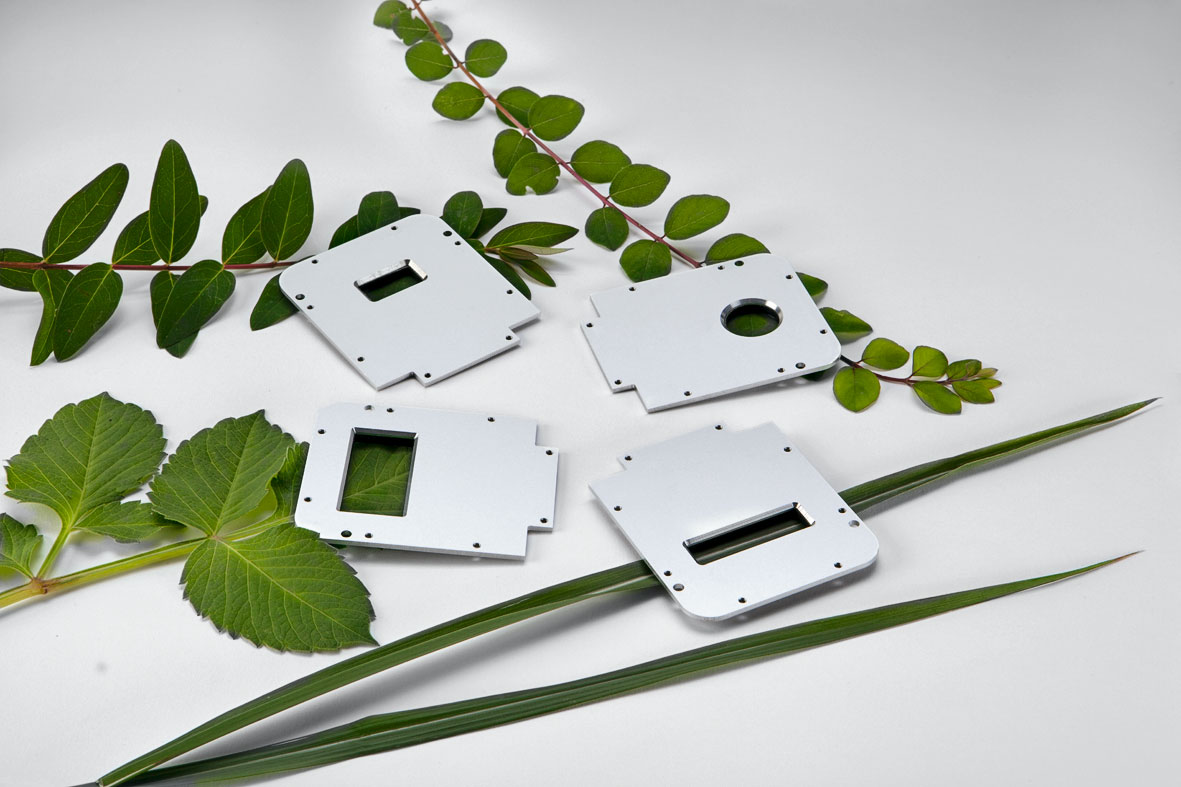 |  |
柱狀葉室
適合地衣、苔蘚、土壤樣品和小動(dòng)物等。
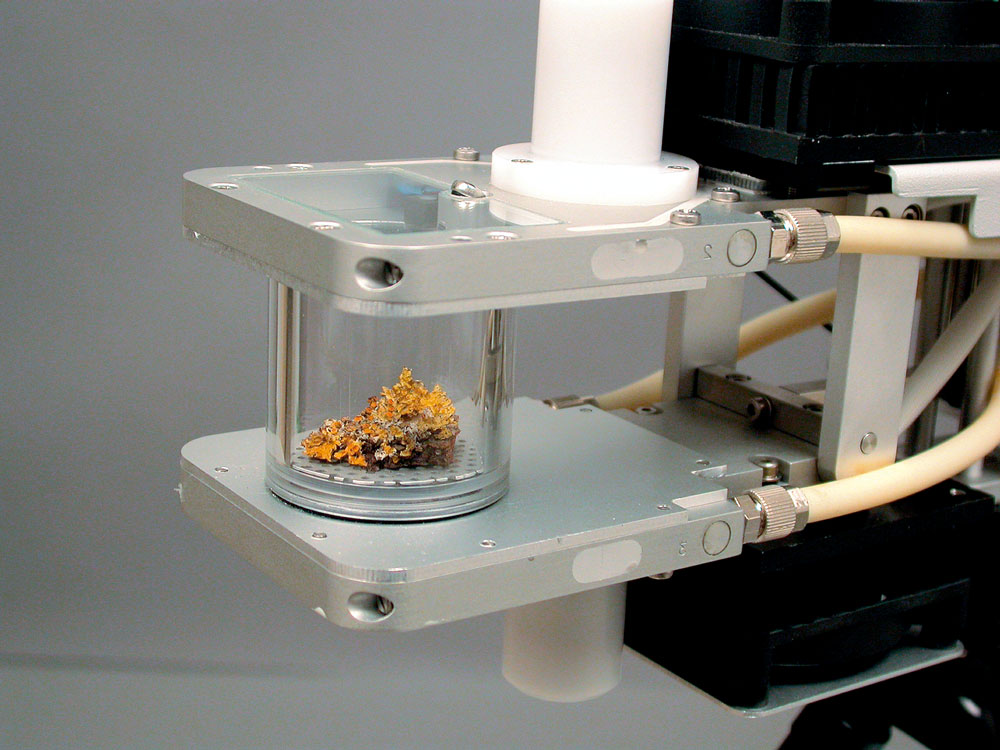 |  |
針葉葉室
適合各種針葉植物葉片或小枝條。
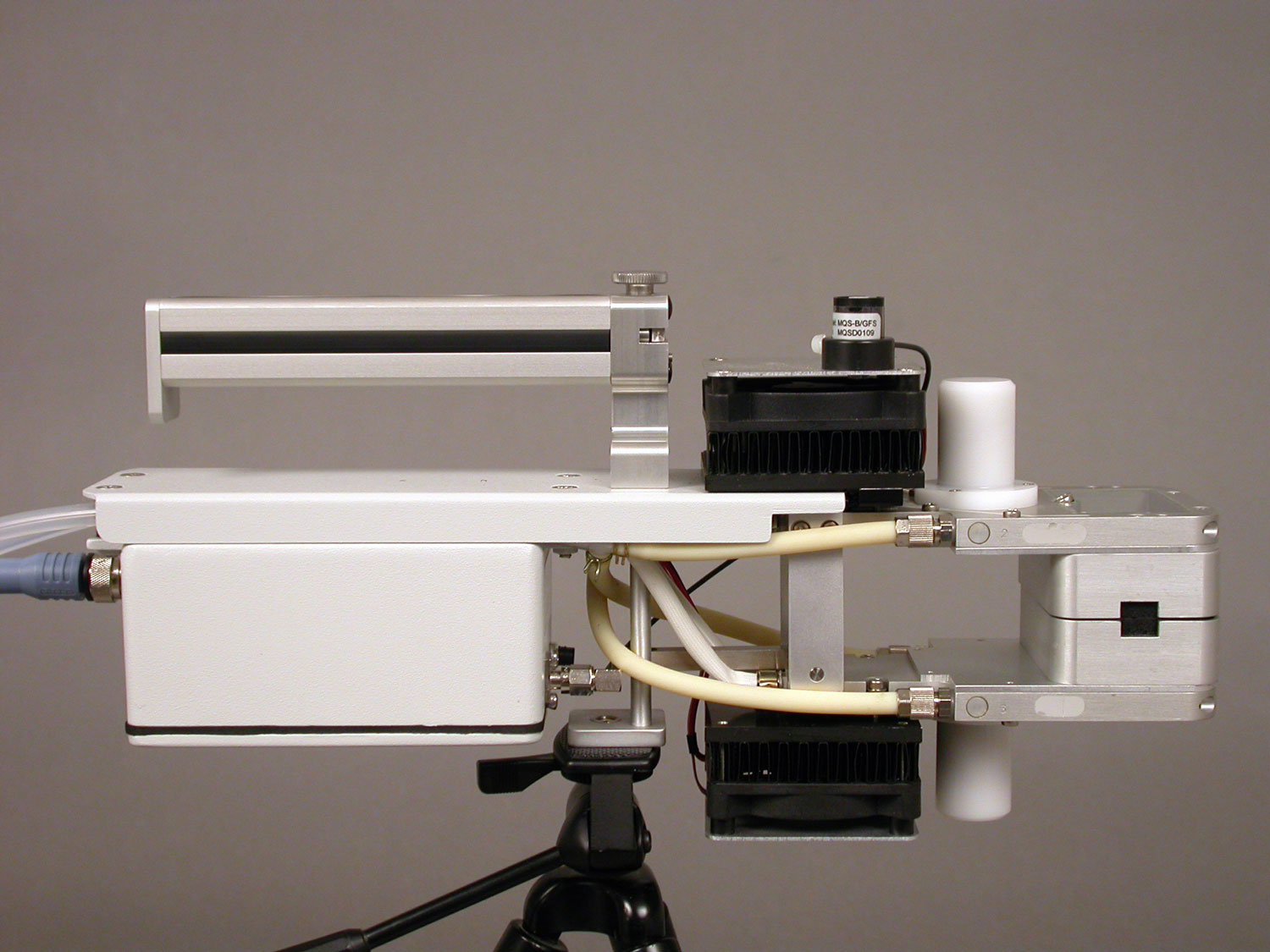 | 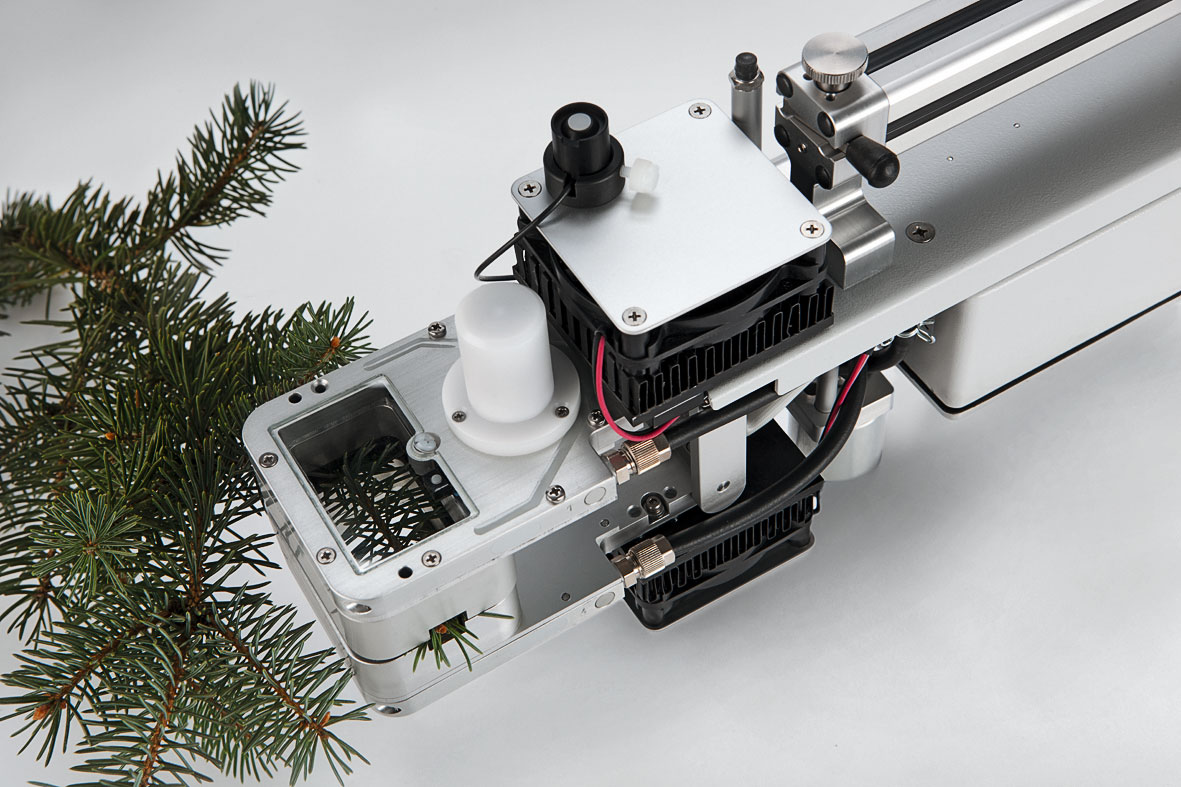 |
擬南芥植株葉室
大容積,可放進(jìn)(盆)直徑 55 cm~70 mm 的盆栽擬南芥或其它小植株。
 |  |
同步測(cè)量植物 CO2 氣體交換與其它光合指標(biāo)的解決方案
光合作用是地球上重要的化學(xué)反應(yīng)之一,是整個(gè)生物圈物質(zhì)循環(huán)與能量流動(dòng)的基礎(chǔ)。測(cè)量生物的光合作用一直是科研界的熱點(diǎn)。
傳統(tǒng)的光合作用測(cè)量主要包括調(diào)制葉綠素?zé)晒猓≒AM 技術(shù))、CO2 氣體交換和光合放氧三大技術(shù),幾十年來(lái)在國(guó)際科研界均得到了廣泛應(yīng)用。由于調(diào)制葉綠素?zé)晒夂?CO2 氣體交換都可以做到無(wú)損、原位、活體測(cè)量,對(duì)同一個(gè)樣品可以進(jìn)行長(zhǎng)期的脅迫處理研究(光合放氧需要破碎葉片),因此應(yīng)用更廣泛一些。
此外,還有一種差式吸收技術(shù),可以通過(guò)測(cè)量光合組分在氧化還原(或加亞基、去亞基)過(guò)程中的差式吸收來(lái)反映他們的活性。如通過(guò)測(cè)量光系統(tǒng) I 反應(yīng)中心葉綠素 P700 的差式吸收來(lái)測(cè)量光系統(tǒng)I的活性(DUAL-PAM-100),通過(guò)測(cè)量 P515/535 的差式吸收來(lái)測(cè)量跨膜質(zhì)子梯度 ΔpH 和玉米黃素(Zea)的變化(DUAL-PAM-100 的 P515/535 模塊),通過(guò)測(cè)量 500-570 nm 的差式吸收來(lái)測(cè)量 C550、Cyt b559、Cyt b563、Cyt c556、Cyt c6、Cyt f 等的活性變化(KLAS-100)。這種技術(shù)信號(hào)弱、難度高,但也具有無(wú)損、原位、活體測(cè)量的特點(diǎn)。隨著雙通道 PAM-100 測(cè)量系統(tǒng) DUAL-PAM-100 的大規(guī)模商業(yè)化生產(chǎn),差式吸收技術(shù)已在國(guó)際光合作用學(xué)界得到廣泛應(yīng)用。
更加可喜的是,可以同步測(cè)量 C550、Cyt b559、Cyt b563、Cyt c556、Cyt c6、Cyt f、P515、Scatt(散射信號(hào))、Zea(玉米黃素)等活性的動(dòng)態(tài) LED 陣列差示吸收光譜儀 KLAS-100 也已研發(fā)成功,大大拓展了差示吸收技術(shù)在光合作用研究領(lǐng)域的應(yīng)用。
除了利用上述幾種技術(shù)進(jìn)行單獨(dú)測(cè)量外,從上世紀(jì) 80 年代后期,逐漸開(kāi)始了兩種技術(shù)的同步測(cè)量,如同步測(cè)量調(diào)制葉綠素?zé)晒馀c CO2 氣體交換、同步測(cè)量調(diào)制葉綠素?zé)晒馀c光合放氧等。
隨著技術(shù)的進(jìn)步,有越來(lái)越多的指標(biāo)可以同步測(cè)量,而且即使是兩種指標(biāo)的同步測(cè)量(如調(diào)制葉綠素?zé)晒馀c CO2 氣體交換),也可以有多種測(cè)量模式可供選擇。
德國(guó) WALZ 公司擁有 CO2 氣體交換、調(diào)制葉綠素?zé)晒夂筒钍轿杖N核心技術(shù)。為了方便廣大科研工作者更深入的了解各種光合作用的同步測(cè)量技術(shù),澤泉生態(tài)開(kāi)放實(shí)驗(yàn)室(Zealquest Laboratory for Ecological Research)總結(jié)出了一套 CO2 氣體交換與其它光合指標(biāo)的同步測(cè)量解決方案,希望能為相關(guān)單位提供參考。
方案功能與設(shè)備
 |
CO2 氣體交換與調(diào)制葉綠素?zé)晒狻⒉钍轿盏燃夹g(shù)的同步測(cè)量,有很多模式可供選擇。下面將根據(jù)技術(shù)難度從低到高的順序,分 5 方面進(jìn)行介紹。
同步測(cè)量一:同步測(cè)量 CO2 氣體交換與葉綠素?zé)晒?/span>
CO2氣體交換與葉綠素?zé)晒獾耐綔y(cè)量,主要有以下幾種模式:
 | 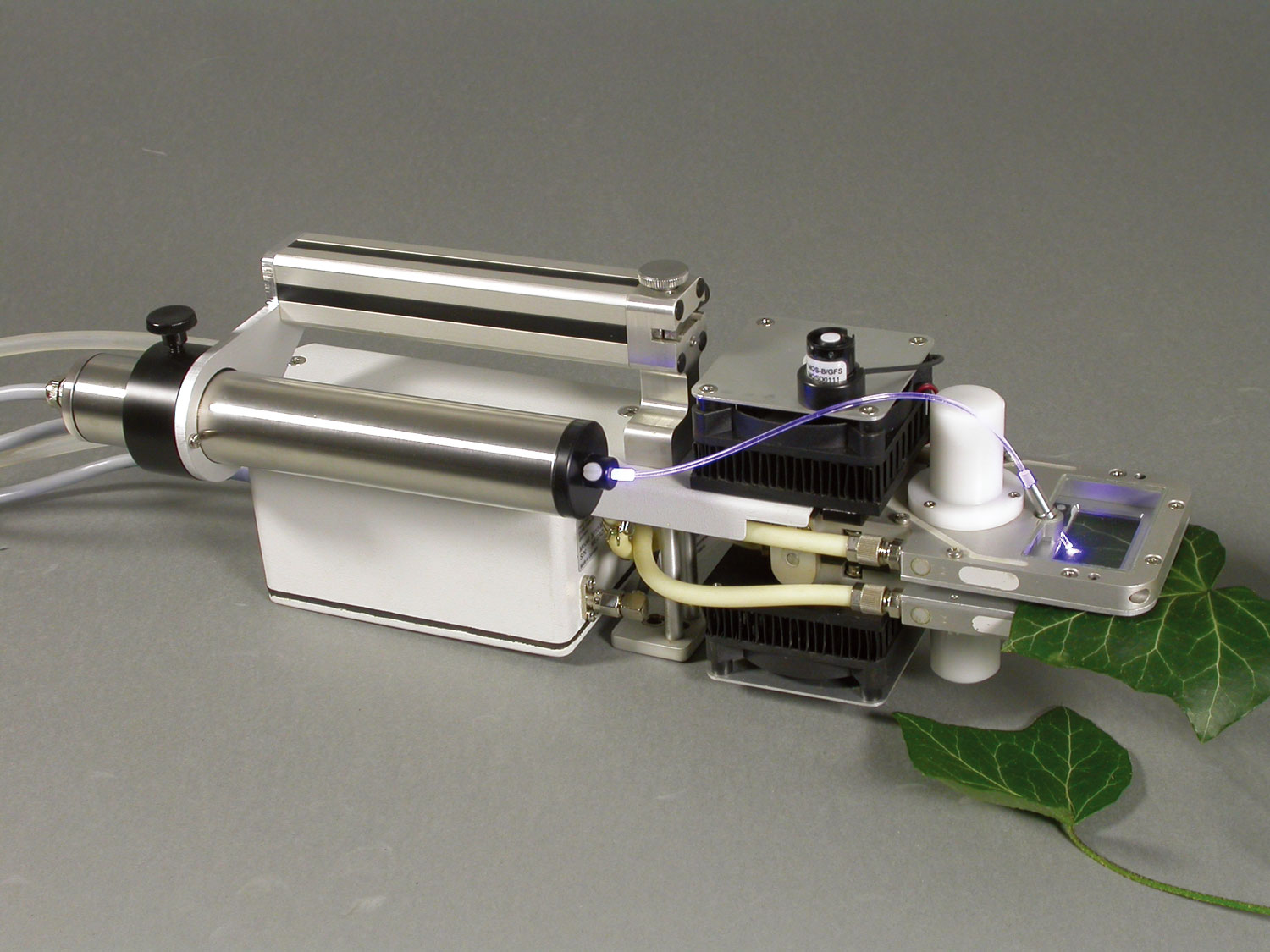 | |
| 模式一(GFS-3000/FL):便攜式光合儀 GFS-3000 連接熒光附件 3057-FL,在儀器提供的人工光下同步測(cè)量氣體交換與葉綠素?zé)晒狻?057-FL 不能單獨(dú)使用。 | 模式二(GFS-3000/F):便攜式光合儀 GFS-3000 連接熒光附件 3050-F,在自然光下或人工光下同步測(cè)量氣體交換與葉綠素?zé)晒狻?050-F 不能單獨(dú)使用。 | |
| | | |
 | 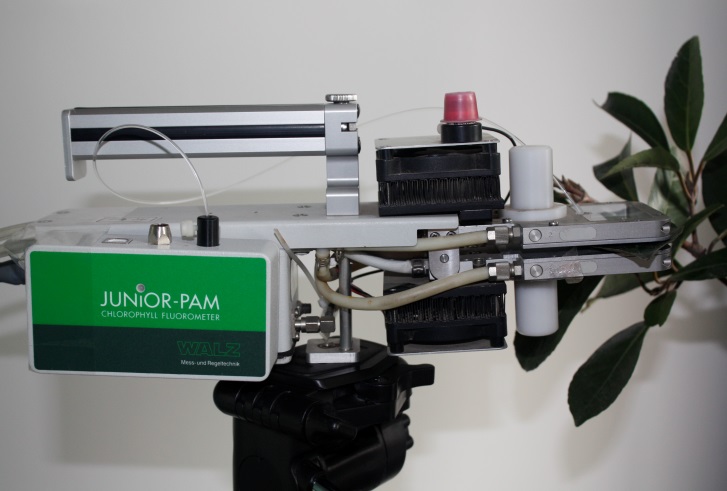 | |
| 模式三(GFS-3000/M):便攜式光合儀 GFS-3000 連接超便攜式調(diào)制熒光儀 MINI-PAM,在自然光下或人工光下同步測(cè)量氣體交換與葉綠素?zé)晒狻INI-PAM 可單獨(dú)使用。 | 模式四(GFS-3000/J):便攜式光合儀 GFS-3000 連接基礎(chǔ)型調(diào)制熒光儀 JUNIOR-PAM,在自然光下或人工光下同步測(cè)量氣體交換與葉綠素?zé)晒狻UNIOR-PAM 可單獨(dú)使用。 |
上述 4 種模式可以根據(jù)需要靈活選擇,特別是模式三,既可同步測(cè)量,也可分開(kāi)測(cè)量。由于光合儀比較沉重,在許多條件苛刻的場(chǎng)合就可以攜帶極便攜的 MINI-PAM 進(jìn)行測(cè)量。
同步測(cè)量二:同步測(cè)量 CO2 氣體交換與葉綠素?zé)晒獬上?/span>
CO2 氣體交換與葉綠素?zé)晒獬上竦耐綔y(cè)量,主要有一下幾種模式【技術(shù)文獻(xiàn)見(jiàn)“代表文獻(xiàn)”部分】。
模式一:與 MINI-IMAGING-PAM 聯(lián)用 測(cè)量面積 2 x 3.2 cm | 模式二:與 MAXI-IMAGING-PAM 聯(lián)用 測(cè)量面積 10 x 13 cm | |
 |  | |
GFS-3000/IM-MINI 連接標(biāo)準(zhǔn)測(cè)量葉室,適合大多數(shù)樣品測(cè)量。 | ||
| | ||
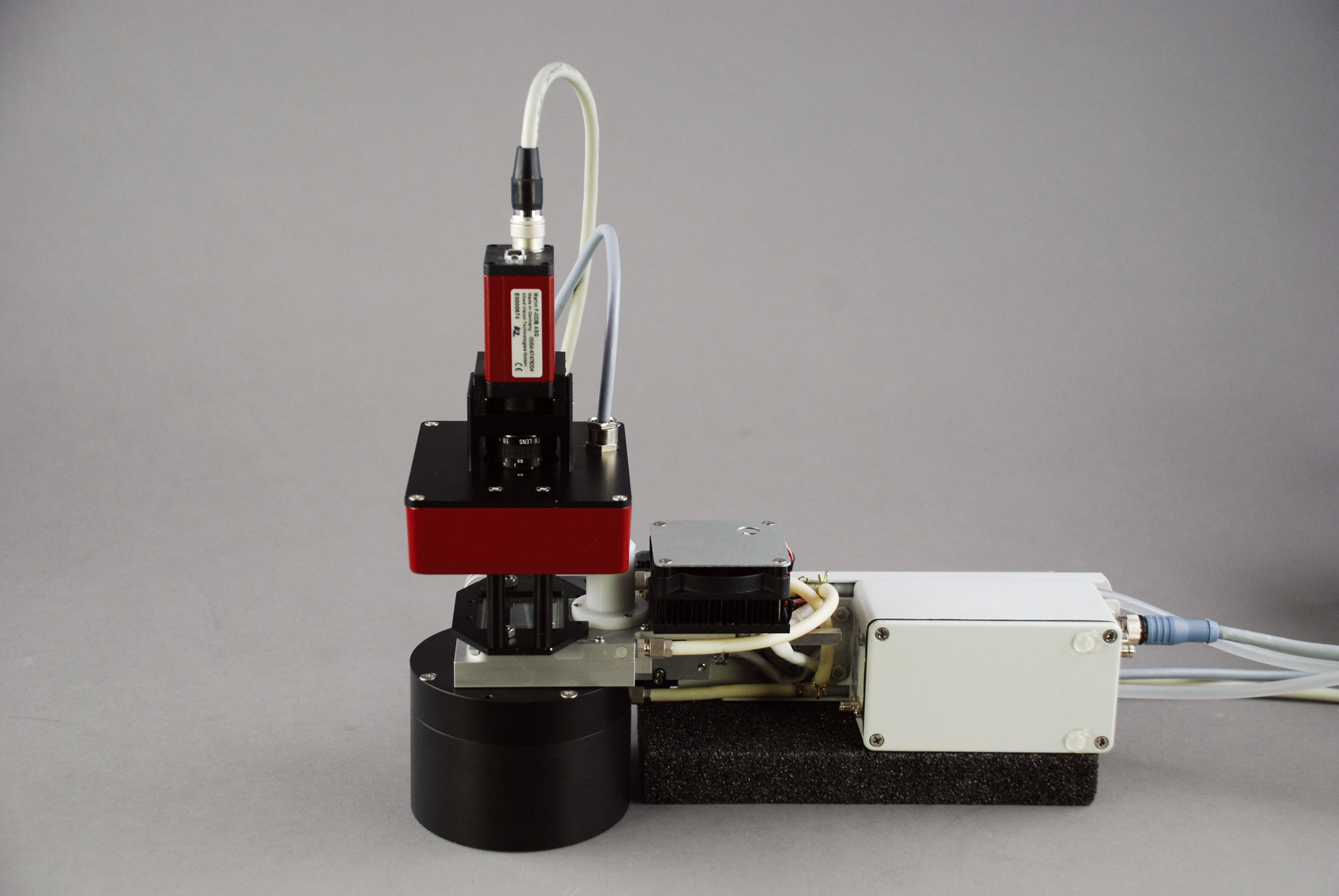 | ||
GFS-3000/IM-MINI-Arabidopsis 連接擬南芥整株葉室,適合小植株的整株測(cè)量。 | GFS-3000/IM-MAXI 連接特制大葉室,適合大型葉片的測(cè)量。 |
由于 M 系列 IMAGING-PAM 可以共用一個(gè)主機(jī)分別連接多個(gè)測(cè)量面積不同的探頭(MAXI-,MINI-,MICROSCOPY-),而 GFS-3000 又有多種葉室可供選擇,這就極大豐富了同步測(cè)量 CO2 氣體交換與葉綠素?zé)晒獬上竦哪J健H绶謩e與 IMAGING-PAM 的 MAXI- 和 MINI- 探頭連接,就可在不同的測(cè)量面積上同步測(cè)量。另外,與擬南芥整株葉室結(jié)合,就可測(cè)量小植株的整株氣體交換和熒光成像。
GFS-3000 設(shè)計(jì)的一個(gè)重要特點(diǎn)就是,標(biāo)準(zhǔn)葉室、柱狀葉室、針葉/簇狀葉室、擬南芥整株葉室的上表面是相同的,都可以與 MINI-IMAGING-PAM 結(jié)合使用,更進(jìn)一步擴(kuò)大了同步測(cè)量的應(yīng)用范圍。
 |
同步測(cè)量三:同步測(cè)量 CO2 氣體交換、P700 與葉綠素?zé)晒?/span>
光合儀 GFS-3000 與 DUAL-PAM-100 測(cè)量系統(tǒng)聯(lián)用,完美實(shí)現(xiàn)了氣體交換、葉綠素?zé)晒馀c差式吸收同步測(cè)量。同步測(cè)量 CO2 氣體交換與 葉綠素?zé)晒夂蚉700 。
系統(tǒng)組成
 |  |  |
| DUAL-PAM-100 | 3010-DUAL | GFS-3000 |
 | ||
| GFS-DUAL | ||
主要功能
同步測(cè)量 P700、葉綠素?zé)晒馀c氣體交換
同步測(cè)量 P700、葉綠素?zé)晒馀c氣體交換的暗-光誘導(dǎo)曲線
同步測(cè)量 P700、葉綠素?zé)晒馀c氣體交換的光響應(yīng)曲線和 CO2 響應(yīng)曲線
典型的氣體交換測(cè)量,如光合作用、蒸騰作用、呼吸作用
典型的葉綠素?zé)晒鉁y(cè)量,如誘導(dǎo)曲線、快速光曲線、淬滅分析、暗馳豫等
典型的 P700 曲線測(cè)量
葉綠素?zé)晒馀c P700 的快速誘導(dǎo)動(dòng)力學(xué)等
編程進(jìn)行復(fù)雜的同步或獨(dú)立測(cè)量
測(cè)量參數(shù)
PS II 參數(shù):Fo, Fm, F, Fm’, Fv/Fm, Y(II), Fo’, qP, qL, qN, NPQ, Y(NPQ), Y(NO) 和 ETR(II) 等
PS I 參數(shù):P700, Pm, Pm’, P700red, Y(I), Y(ND), Y(NA) 和 ETR(I) 等
氣體交換參數(shù):參比室和樣品室的 CO2 絕對(duì)值(CO2abs,CO2sam),參比室和樣品室的 H2O 絕對(duì)值(H2Oabs,H2Osam),流速(gas flow),環(huán)境氣壓(Pamb),葉室溫度(Tcuv),葉片溫度(Tleaf),環(huán)境溫度(Tamb),環(huán)境 PAR(PARamb),葉室內(nèi)葉片正面 PAR(PARtop),葉室內(nèi)葉片背面 PAR(PARbot),葉室相對(duì)濕度(rH),蒸騰速率(E),水氣壓飽和虧(VPD),葉片氣孔導(dǎo)度(GH2O),凈光合速率(A),胞間 CO2 濃度(Ci),環(huán)境 CO2 濃度(Ca),植物水分利用效率,CO2 響應(yīng)曲線,光響應(yīng)曲線等
DUAL-PAM 氣體交換葉室——3010-DUAL
 |  |
| 3010-DUAL | 3010-DUAL 與 DUAL-PAM-100 的測(cè)量頭連接 |
專為 DUAL-PAM-100 與 GFS-3000 的同步測(cè)量設(shè)計(jì),由特制葉室(帶溫度和 PAR 傳感器)、風(fēng)扇、導(dǎo)光桿、電子盒與支架構(gòu)成。同步測(cè)量時(shí),光源完全由 DUAL-PAM-100 的測(cè)量頭提供,氣體交換由 GFS-3000 的紅外分析器檢測(cè),P700和葉綠素?zé)晒庥?DUAL-PAM-100 的檢測(cè)器測(cè)量。
需要注意的是,3010-DUAL 可以連接 DUAL-PAM-100 的 DUAL-DB 測(cè)量頭,但不能連接 DUAL-DR 測(cè)量頭。DUAL-DR 的光學(xué)單元太復(fù)雜,連接 3010-DUAL 容易損傷 DUAL-DR。
測(cè)量實(shí)例
下面的兩個(gè)圖是以洋常春藤(Hedera helix)為材料,利用本系統(tǒng)同步測(cè)量的 P700、葉綠素?zé)晒夂蜌怏w交換的誘導(dǎo)曲線。
 |
| 洋常春藤(Hedera helix)的 P700(藍(lán)色)和葉綠素?zé)晒猓t色)的誘導(dǎo)曲線 |
 |
| 洋常春藤(Hedera helix)的凈光合速率(紅色)和氣孔導(dǎo)度(藍(lán)色)的誘導(dǎo)曲線 |
同步測(cè)量四:同步測(cè)量 CO2 氣體交換與跨膜質(zhì)子動(dòng)力勢(shì)(pmf)、跨膜質(zhì)子梯度(ΔpH) 、跨膜電位(ΔΨ)和玉米黃素(Zea)
P515/535 模塊是 WALZ 公司為 DUAL-PAM-100 設(shè)計(jì)的測(cè)量模塊,可以直接連接 DUAL-PAM-100 的主機(jī),測(cè)量 550-510 nm 的差式吸收以及 535 nm 波長(zhǎng)的信號(hào)變化。P515/535 模塊可以測(cè)量光合器官的跨膜質(zhì)子動(dòng)力勢(shì)(pmf)、跨膜電位(Δψ)、跨膜質(zhì)子梯度(ΔpH)和玉米黃素(Zea)變化等內(nèi)容。此外,該模塊還提供一種特殊的 “P515 Flux” 操作模式,可讓光化光以光-暗脈沖形式打開(kāi)-關(guān)閉(1/1調(diào)制光/暗),原位測(cè)量活體樣品處于穩(wěn)態(tài)的偶聯(lián)電子和質(zhì)子的流動(dòng)速率。
GFS-3000 通過(guò)專用氣體交換葉室 3010-DUAL 與 DUAL-PAM-100 以及 P515/535 模塊聯(lián)用后,做到了同步測(cè)量 CO2 氣體交換與跨膜質(zhì)子動(dòng)力勢(shì)(pmf)、跨膜質(zhì)子梯度(ΔpH) 、跨膜電位(ΔΨ)和玉米黃素(Zea)。由于 ΔpH 和 Zea 都與葉黃素循環(huán)密切相關(guān),而葉黃素循環(huán)是植物光保護(hù)的重要調(diào)節(jié)機(jī)制,再結(jié)合氣體交換指標(biāo)反映的 Calvin 循環(huán)狀況,就可以非常深入的對(duì)植物光保護(hù)調(diào)節(jié)機(jī)制進(jìn)行研究。
 | ||
 | 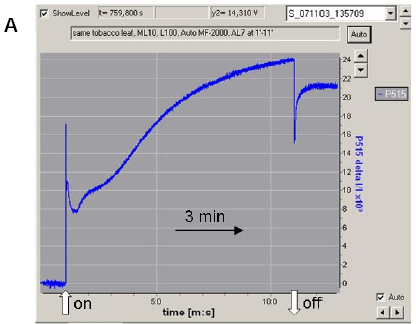 |  |
| DUAL-PAM-100 P515/535 與 GFS-3000 聯(lián)用 | ||
同步測(cè)量五:同步測(cè)量 CO2 氣體交換與 C550、Cyt b559、Cyt b563、Cyt c556、Cyt c6、Cyt f、P515、Scatt(散射信號(hào))、Zea(玉米黃素)
傳統(tǒng)的差式吸收技術(shù)每次只能測(cè)量一個(gè)組分的差式吸收變化,而光合機(jī)構(gòu)特別復(fù)雜,很多組分是偶聯(lián)在一起發(fā)揮作用的,幾種組分分開(kāi)測(cè)量的結(jié)果難以完美表征它們?cè)谂悸?lián)的功能體下的實(shí)際作用機(jī)制。
Schreiber 教授花費(fèi) 20 年時(shí)間研制的動(dòng)態(tài) LED 陣列差式吸收光譜儀 KLAS-100 完美的解決了上述缺陷。它采用 500-570 nm的差示吸收光譜技術(shù)來(lái)同步測(cè)量光合膜上 C550、Cyt b559、Cyt b563、Cyt c556、Cyt c6、Cyt f、P515、Scatt(散射信號(hào))、Zea(玉米黃素)等8種組分的氧化還原變化。
著名的 DUAL-PAM-100 測(cè)量系統(tǒng)只有兩個(gè)測(cè)量通道,而 KLAS-100 有 10 個(gè)測(cè)量通道。因此,1 臺(tái) KLAS-100 相當(dāng)于 5 臺(tái) DUAL-PAM-100 的功能。
GFS-3000 通過(guò) 3010-DUAL 專用氣體交換葉室與 KLAS-100 聯(lián)用后,做到了同步測(cè)量 CO2 氣體交換與 C550、Cyt b559、Cyt b563、Cyt c556、Cyt c6、Cyt f、P515、Scatt(散射信號(hào))、Zea(玉米黃素)。
這些測(cè)量指標(biāo)結(jié)合在一起,可以進(jìn)行非常復(fù)雜的、前人未做過(guò)的深入研究。KLAS-100 是剛剛發(fā)展成熟的一種技術(shù),在著名的《Plant Physiology》上發(fā)表了兩篇文獻(xiàn)。
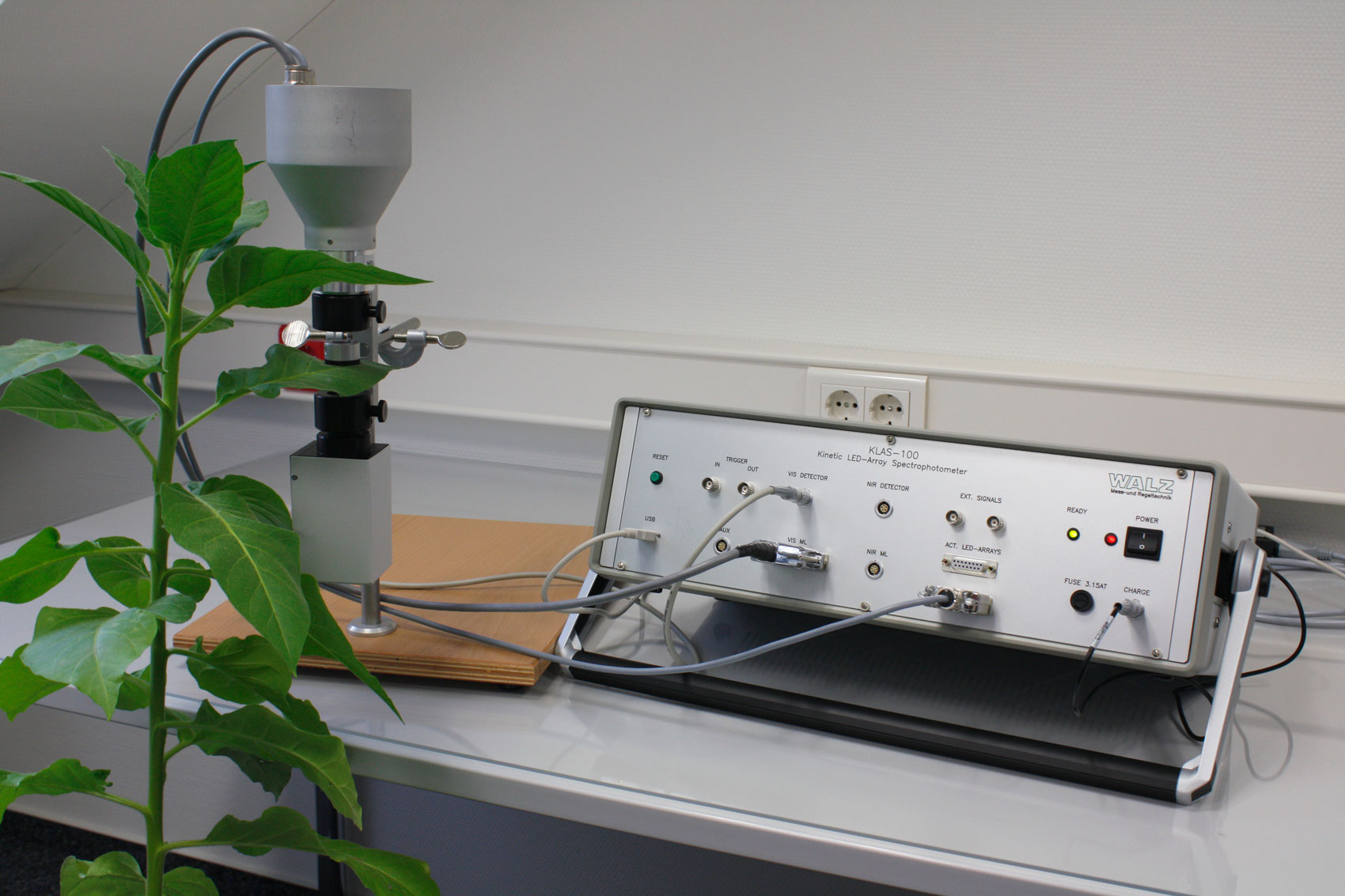 |
| KLAS-100 |
同步測(cè)量技術(shù)選購(gòu)指南
利用 GFS-3000 與其它技術(shù)(調(diào)制葉綠素?zé)晒狻⒉钍轿眨┑穆?lián)用,可以實(shí)現(xiàn)多種光合指標(biāo)的同步測(cè)量,利用無(wú)損、原位、活體的測(cè)量進(jìn)行非常復(fù)雜、深入的機(jī)理性研究。下表是實(shí)現(xiàn)這些測(cè)量功能的選購(gòu)指南:
 |
產(chǎn)地:德國(guó) WALZ
代表文獻(xiàn)
數(shù)據(jù)來(lái)源:光合作用文獻(xiàn) Endnote 數(shù)據(jù)庫(kù)
原始數(shù)據(jù)來(lái)源:Google Scholar
1. Abiola, Y. O., et al. (2025). "Contrasting leaf structural, photosynthetic and allocation responses to elevated [CO2] in different-aged leaves of tropical fruit trees Persea americana and Annona muricata." Plant Physiology and Biochemistry: 109842.
2. Ansari, R., et al. (2025). "Photosynthetic efficiency and chlorophyll fluorescence responses of Viola ignobilis Rupr. subjected to different biostimulants and two light intensities." Journal of Horticulture and Postharvest Research: 213-228.
3. Bacalu-Rus, D., et al. (2025). "The Influence of Heavy Metals Contained in Sludge Used as Fertilizer for the Dahlia Variabilis Plant on Photosynthetic Traits." WSEAS Transactions on Environment and Development 21: 417-425.
4. Barboza, L. (2025). "Physiological Impacts of Bemisia Tabaci MEAM1 Infestation on Soybean Cultivars with Different Levels of Resistance." J Environ Pollut 1(1): 01-09.
5. Brodsky, V., et al. (2025). "Acclimation of carbon metabolism to a changing environment across a leaf rosette of Arabidopsis thaliana." Plant Stress: 100958.
6. Castillo, C., et al. (2025). "In vivo transformations of positively charged nanoparticles alter the formation and function of RuBisCO photosynthetic protein corona." Nature Nanotechnology.
7. Chavan, S. B., et al. (2025). "Optimizing tree shade gradients in Emblica officinalis-based agroforestry systems: impacts on soybean physio-biochemical traits and yield under degraded soils." Agroforestry systems 99(1): 21.
8. Contreras-Serrano, M., et al. (2025). "Increased Growth Temperatures Alter Arctic Plant Responses to Heat Wave and Drought." Global change biology 31(4): e70187.
9. Copaciu, F., et al. (2025). "Enhancing UV-B Protection and Abiotic Stress Tolerance in Tomato Plants: The Role of Silicon Nanoparticles in Photosynthetic Parameters, Pigments, and Secondary Metabolite Production." Plants 14(16): 2599.
10. D’Angieri, M., et al. (2025). "Sulfur supply and ammonium toxicity affect photosynthesis and plant nutrition in Tanzania guinea grass." Theoretical and Experimental Plant Physiology 37(1): 39.
11. de Farias, R. M., et al. (2025). "Physiology, biochemistry and yield of melon in a semi-arid region with the application of biostimulants1." Brazilian Journal of Agricultural and Environmental Engineering 29(1): e283055.
12. Diao, H., et al. (2025). "Contrasting photosynthetic, stomatal and mesophyll mechanisms drive common reductions in leaf water-use efficiency under blue light." Journal of Experimental Botany.
13. Dziubek, D., et al. (2025). "Dissection of photosynthetic short and long-term acclimation to fluctuating light reveals specific functions within the chloroplast thioredoxin network." Journal of Experimental Botany.
14. Fan, B., et al. (2025). "Different water and photosynthetic resource use strategies explain the widespread distribution of Dasiphora fruticosa in Qinghai-Tibet Plateau alpine meadows." Environmental and Experimental Botany 231: 106106.
15. Fateminia, F., et al. (2025). "Effects of gamma-aminobutyric acid, melatonin, and potassium phosphite on the growth and photosynthetic efficiency of Citrus aurantium L. seedling." Journal of Plant Process and Function 13(64): 49-60.
16. Gómez-Gallego, M., et al. (2025). "Light Limitation and Foliar Pathogenic Infection Impact Phloem Anatomy and Function in Pinus radiata D. Don." Plant, Cell & Environment n/a(n/a).
17. Gu, L., et al. (2025). "Regulatory Coordination of Photophysical, Photochemical, and Biochemical Reactions in the Photosynthesis of Land Plants." Plant Direct 9(5): e70080.
18. Guo, L., et al. (2025). "Salt-alkali-tolerant growth-promoting Streptomyces sp. Jrh8-9 enhances alfalfa growth and resilience under saline-alkali stress through integrated modulation of photosynthesis, antioxidant defense, and hormone signaling." Microbiological Research 296: 128158.
19. Hartwig, R. P., et al. (2025). "Drought response of the maize plant-soil-microbiome system is influenced by plant size and presence of root hairs." Annals of Botany.
20. Jia, Y., et al. (2025). "Endophytic fungi enhance drought tolerance in Fagopyrum tataricum: Insights into flavonoid biosynthesis and photosynthetic pathways." Agricultural Water Management 313: 109496.
21. Jiang, J., et al. (2025). "Livestock and poultry manure influence thallium accumulation in chili peppers (Capsicum annuum) under complex toxic elements contamination in soil." Journal of hazardous materials 482: 136605.
22. Kang, J., et al. (2025). "TAC-C uncovers open chromatin interaction in crops and SPL-mediated photosynthesis regulation." Science Advances 11(22): eadu6565.
23. Khan, A., et al. (2025). "Mitochondria-mediated retrograde responses evoked by inhibitor antimycin A and mtDNA elimination in Chlamydomonas reinhardtii." International Journal of Biological Macromolecules: 144690.
24. Lehr, P. P., et al. (2025). "Guard Cell-Specific Metabolic Responses to Drought Stress in Maize." Journal of Agronomy and Crop Science 211(2): e70049.
25. Lehr, P. P., et al. (2025). "Sulfate enhances metabolic acclimation under drought stress – a comparative study of grapevine and maize." Plant Stress: 100938.
26. Li, Q., et al. (2025). "Correlation Analysis of Twig and Leaf Characteristics and Leaf Thermal Dissipation of Hippophae rhamnoides in the Riparian Zone of the Taohe River in Gansu Province, China." Plants 14(2): 282.
27. Li, Y., et al. (2025). "Impacts of non-steroidal anti-inflammatory drugs on Phragmites australis root exudation throughout plant life cycle: Defense responses and phytoremediation potential." Journal of Environmental Sciences.
28. Li, Z., et al. (2025). "Continuous Cropping Duration Alters Green Pepper Root Exudate Composition and Triggers Rhizosphere Feedback Inhibition." Agronomy 15(8): 2010.
29. Lima, J. V. L., et al. (2025). "Synergistic Effect of Exogenous Application of Proline and Boric Acid on the Growth, Physiological Aspects, and Postharvest Quality of Radish under Salt Stress." ACS Omega.
30. Lima, V. F., et al. (2025). "The fern Nephrolepis exaltata is largely unresponsive to climate change conditions at both physiological and metabolic levels." The Plant Journal 123(3): e70397.
31. Lin, S., et al. (2025). "Hydrogen sulfide improves photosynthetic efficiency by regulating light energy dissipation and reversible phosphorylation of thylakoid proteins in rice under salt stress." Plant Physiology and Biochemistry: 109908.32. Liu, J., et al. (2025). "Anthocyanins promote the abundance of endophytic lactic acid bacteria by reducing ROS in Medicago truncatula." The Plant Journal 122(1): e70127.
33. Liu, W., et al. (2025). "The role of the sucrose synthase gene in promoting thorn occurrence and vegetative growth in Lycium ruthenicum." Plant Molecular Biology 115(1): 30.
34. Luo, Y., et al. (2025). "Effect of the fungal endophyte Epichlo? sinensis on the physiology of different Festuca sinensis ecotypes under salt-alkaline treatment." Plant and Soil.
35. Ma, X., et al. (2025). "Influences of environmental and leaf functional traits variations on photosynthetic characteristics of Cotoneaster multiflorus in Xinglong Mountain." Frontiers in Plant Science Volume 16 - 2025.
36. Mao, H.-T., et al. (2025). "Chlorophyll b is essential for the growth, photoprotection, and photosystem I assembly in wheat." The Plant Journal 123(4): e70442.
37. Marcelino, R. M. d. S., et al. (2025). "Salicylic acid mitigates damage caused by water deficit in forage sorghum1." Brazilian Journal of Agricultural and Environmental Engineering 29(3): e286824.
38. Márquez, D., et al. (2025). "Navigating Challenges in Interpreting Plant Physiology Responses through Gas Exchange Results in Stressed Plants." Plant Ecophysiology.
39. Ormond, A., et al. (2025). "The trade-off between photosynthetic rate and thallus moisture-demand explains lichen habitat association with the temperate rainforest." Oecologia 207(3): 48.
40. Osipova, S. V., et al. (2025). "Drought tolerance of the photosynthetic apparatus of bread wheat (Triticum aestivum L.) lines with introgressions in chromosome 2D from Aegilops tauschii Coss." Vavilovskii Zhurnal Genet Selektsii 29(4): 530-538.
41. Pappert, I., et al. (2025). "Effects of high light intensity and spectral variability on maize photosynthesis and growth." Frontiers in Plant Science 16.
42. Perez, R., et al. (2025). "A Comprehensive Database of Leaf Temperature, Water, and CO 2 Fluxes in Young Oil Palm Plants Across Diverse Climate Scenarios."
43. Qu, Y., et al. (2025). "Identification and characterization of compounds that improve plant photosynthesis and growth under light stress conditions." Communications Biology 8(1): 300.
44. Schober, T., et al. (2025). "The effects of plant density and duration of vegetative growth phase on agronomic traits of medicinal cannabis (Cannabis sativa L.): A regression analysis." PLoS ONE 19(12): e0315951.
45. Schuler, P., et al. (2025). "PANDA: A simple and affordable chamber system for measuring the whole-plant net CO2 flux." bioRxiv: 2025.2006. 2002.657330.
46. Seydel, C., et al. (2025). "Subcellular plant carbohydrate metabolism under elevated temperature." Plant Physiology.
47. Shi, Q., et al. (2025). "Optimising Peanut Growth: Exogenous Calcium Enhances Photosynthesis in Phosphorus-Limited Environments." Plant, Cell & Environment n/a(n/a).
48. Silva, A. G. C. d., et al. (2025). "Methyl jasmonate as an attenuator of salt stress on the morphophysiological aspects of red rice." Rev. bras. eng. agríc. ambient 12(29).
49. Silva, A. G. C. d., et al. (2025). "Methyl jasmonate as an attenuator of salt stress on the morphophysiological aspects of red rice1." Brazilian Journal of Agricultural and Environmental Engineering.
50. Sommer, N., et al. (2025). "The potential of four legume trees for mercury phytoremediation and the role of arbuscular mycorrhizal fungi."
51. Takeuchi, K., et al. (2025). "PSII Photoinhibition as a Protective Strategy: Maintaining an Oxidative State of PSI by Suppressing PSII Activity Under Environmental Stress." Physiologia plantarum 177(4): e70392.
52. Th?lix, L., et al. (2025). "Carbon sequestration in different urban vegetation types in Southern Finland." Biogeosciences 22(3): 725-749.
53. Trinh, M. D. L., et al. (2025). "Chloroplast envelope-localized DLDG1 modulates H+ translocation across thylakoid membranes via plastidial ATP synthase." Plant Physiology.
54. Wang, Y., et al. (2025). "Photosynthetic Characteristics and Leaf Structure of Yellow-leafed Lilium davidii Var. unicolor." HortScience 60(4): 587-600.
55. Wegher, M., et al. (2025). "Impact of leaf removal on recovery of young grapevines under heatwave conditions: A study in an ecotron environment." OENO One 59(3).
56. Wei, G., et al. (2025). "Chloride Application Enhances Photosynthesis and Facilitates Nitrate Translocation While Driving Chloride Translocation Into Roots." Food and Energy Security 14(3): e70095.
57. Wu, D., et al. (2025). "Supplementary Calcium Overcomes Nocturnal Chilling-Induced Carbon Source-Sink Limitations of Cyclic Electron Transport in Peanuts." Plant, Cell & Environment n/a(n/a).
58. Wu, R., et al. (2025). "Rhizophagus intraradices enhances soybean tolerance to soda saline-alkaline stress through coordinated regulation of ionic homeostasis and photosynthetic efficiency during critical growth stages." Plant Physiology and Biochemistry: 110382.
59. Wu, R., et al. (2025). "Rhizophagus irregularis combined with biochar enhances Cr tolerance in Ricinus communis by altering host plant's antioxidant and photosynthetic characteristics." Industrial Crops and Products 227: 120769.
60. Yongxing, Z., et al. (2025). "夾沙分層配土條件下紫花苜蓿的光合及蒸騰特性研究." Guan'gai Paishui Xuebao= Journal of Irrigation and Drainage 44(4): 47.
61. Zhang, X., et al. (2025). "Effects of litter layer alterations caused by increasing stand age on the seed germination and seedling establishment of Robinia pseudoacacia plantations." Forest Ecology and Management 594: 122960.
62. Zhang, Y.-L., et al. (2025). "Trees use exogenous sugars for growth, but excess triggers negative feedback reducing photosynthetic carbon gain." Tree physiology.
